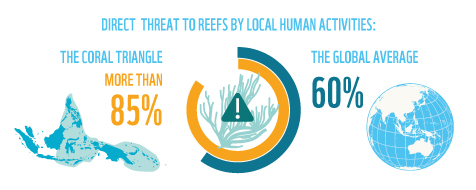The WWF is run at a local level by the following offices...
The spectacular landscapes and natural riches of the Coral Triangle are under threat. Overfishing, climate change, unsustainable tourism, habitat destruction, poor governance are some of the threats that are affecting marine diversity and the livelihoods of people who depend on it.

© WWF-US



These problems are already happening and will worsen if suitable actions are not taken. Below, learn about what WWF is doing to address some of the major issues that are threatening the Coral Triangle's biodiversity.
Climate Change
► More about climate change in the Coral Triangle
► What WWF is doing about climate change in the Coral Triangle

© MODIS Land Rapid Response Team at NASA GSFC
Overfishing / Illegal fishing
► What WWF is doing about overfishing/illegal fishing in the Coral Triangle

© WWF
Unsustainable Tourism
► What WWF is doing about unsustainable tourism in the Coral Triangle

© WWF Finland/ Antii Siponen
Habitat degradation
► What WWF is doing about habitat degradation in the Coral Triangle

© WWF / Jürgen FREUND
Irresponsible Investments
► What WWF is doing about irresponsible investments through sustainable fisheries, blue economy and nature-based tourism in the Coral Triangle.

© Shutterstock / pryzmat / WWF
Extractive Industries
► What is WWF doing about Extractive Industries

© Michael Sutton / WWF
Poor governance
► More on governance
► What is WWF doing about poor governance in the Coral Triangle

© UN Photo_Jean-Marc Ferré